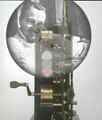Template:Selected anniversaries/April 14: Difference between revisions
No edit summary |
No edit summary |
||
| Line 3: | Line 3: | ||
File:Statue of Ibn Rushd in Cordoba.jpg|link=Ibn Rushd (nonfiction)|1126: Polymath [[Ibn Rushd (nonfiction)|Ibn Rushd]] (Averoess) born. He will write on logic, Aristotelian and Islamic philosophy, theology, Islamic jurisprudence, psychology, politics, music theory, geography, mathematics, and the mediæval sciences of medicine, astronomy, physics, and celestial mechanics. | File:Statue of Ibn Rushd in Cordoba.jpg|link=Ibn Rushd (nonfiction)|1126: Polymath [[Ibn Rushd (nonfiction)|Ibn Rushd]] (Averoess) born. He will write on logic, Aristotelian and Islamic philosophy, theology, Islamic jurisprudence, psychology, politics, music theory, geography, mathematics, and the mediæval sciences of medicine, astronomy, physics, and celestial mechanics. | ||
File:Abraham Ortelius by Peter Paul Rubens.jpg|link=Abraham Ortelius (nonfiction)|1527: Cartographer and geographer [[Abraham Ortelius (nonfiction)|Abraham Ortelius]] born. Ortelius will create the first modern atlas, the ''Theatrum Orbis Terrarum''. He will also be one of the first to imagine that the continents were joined together before drifting to their present positions. | File:Abraham Ortelius by Peter Paul Rubens.jpg|link=Abraham Ortelius (nonfiction)|1527: Cartographer and geographer [[Abraham Ortelius (nonfiction)|Abraham Ortelius]] born. Ortelius will create the first modern atlas, the ''Theatrum Orbis Terrarum''. He will also be one of the first to imagine that the continents were joined together before drifting to their present positions. | ||
| Line 19: | Line 17: | ||
||1678: Abraham Darby I born ... iron master ... developed a method of producing pig iron in a blast furnace fuelled by coke rather than charcoal. This was a major step forward in the production of iron as a raw material for the Industrial Revolution. Pic search. | ||1678: Abraham Darby I born ... iron master ... developed a method of producing pig iron in a blast furnace fuelled by coke rather than charcoal. This was a major step forward in the production of iron as a raw material for the Industrial Revolution. Pic search. | ||
||1792: Maximilian Hell dies ... astronomer and an ordained Jesuit priest from the Kingdom of Hungary. Pic. | ||1792: Maximilian Hell dies ... astronomer and an ordained Jesuit priest from the Kingdom of Hungary. Pic. | ||
| Line 35: | Line 31: | ||
||1886: Ralph Elmer Wilson born ... astronomer. Pic search. | ||1886: Ralph Elmer Wilson born ... astronomer. Pic search. | ||
||1891: Wilhelm Fenner born ... German cryptanalyst, before and during the time of World War II in the OKW/Chi, the Cipher Department of the High Command of the Wehrmacht, working within the main cryptanalysis group, and entrusted with deciphering enemy message traffic (Cryptography). Pic. | ||1891: Wilhelm Fenner born ... German cryptanalyst, before and during the time of World War II in the OKW/Chi, the Cipher Department of the High Command of the Wehrmacht, working within the main cryptanalysis group, and entrusted with deciphering enemy message traffic (Cryptography). Pic. | ||
| Line 100: | Line 94: | ||
||2007: Frank Henry Westheimer dies ... chemist. He did pioneering work in physical organic chemistry, applying techniques from physical to organic chemistry and integrating the two fields. He explored the mechanisms of chemical and enzymatic reactions, and made fundamental theoretical advances. Pic. | ||2007: Frank Henry Westheimer dies ... chemist. He did pioneering work in physical organic chemistry, applying techniques from physical to organic chemistry and integrating the two fields. He explored the mechanisms of chemical and enzymatic reactions, and made fundamental theoretical advances. Pic. | ||
</gallery> | </gallery> | ||
Revision as of 21:13, 26 January 2022
1126: Polymath Ibn Rushd (Averoess) born. He will write on logic, Aristotelian and Islamic philosophy, theology, Islamic jurisprudence, psychology, politics, music theory, geography, mathematics, and the mediæval sciences of medicine, astronomy, physics, and celestial mechanics.
1527: Cartographer and geographer Abraham Ortelius born. Ortelius will create the first modern atlas, the Theatrum Orbis Terrarum. He will also be one of the first to imagine that the continents were joined together before drifting to their present positions.
1629: Mathematician, astronomer, and physicist Christiaan Huygens born. He will be a leading scientist of his time.
1659: Proposals to flood the Sistine chapel "are equally useless to Science and Art alike," writes Christiaan Huygens in a private letter to Pope Alexander VII.
1882: Physicist and philosopher Moritz Schlick born.
1894: The first ever commercial motion picture house opened in New York City using ten Kinetoscopes, a device for peep-show viewing of films.
1899: Mathematician Gabriel Sudan born. He will discover the Sudan function, an important example in the theory of computation, similar to the Ackermann function.
1900: The Exposition Universelle begins in Paris, France.
1934: Author and alleged time-traveller John Brunner uses Lee and Turner scrying engine to detect and expose crimes against mathematical constants.
1935: Mathematician Emmy Noether dies. She made landmark contributions to abstract algebra and theoretical physics.
1964: Mathematician and theorist Tatyana Afanasyeva dies. She contributed to statistical mechanics and statistical thermodynamics, and to mathematical education in the Netherlands.










